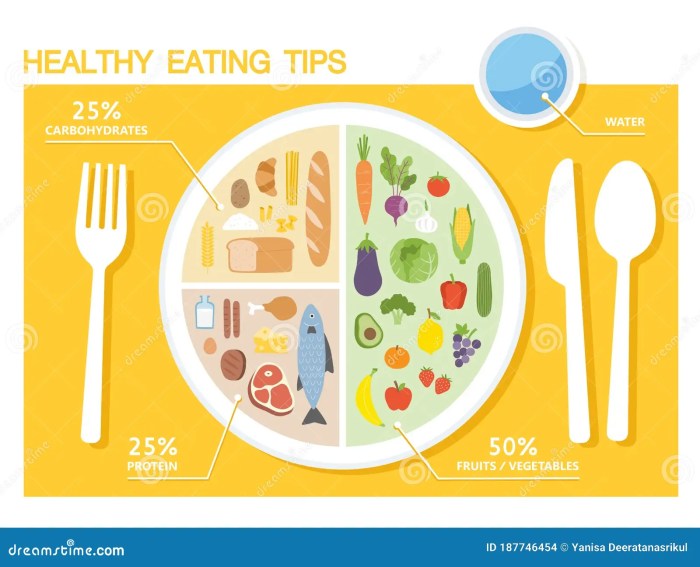Balanced Diet Tips: Starting your journey towards a healthier lifestyle, understanding the importance of a balanced diet is the first step in achieving overall well-being and vitality. Dive into the world of nutrition with these essential tips!
When it comes to maintaining a healthy lifestyle, what you eat plays a crucial role. From the nutrients your body needs to the impact on energy levels, a balanced diet is the foundation for a vibrant life.
Importance of a Balanced Diet
Eating a balanced diet is crucial for maintaining overall health and well-being. It provides the necessary nutrients that our bodies need to function properly and stay healthy. A balanced diet can help prevent various health issues and boost our immune system, making us more resilient to illnesses.
Essential Nutrients in a Balanced Diet
- Protein: Essential for building and repairing tissues in the body.
- Carbohydrates: Main source of energy for the body, especially important for brain function.
- Fats: Important for absorbing vitamins and maintaining cell structure.
- Vitamins: Support various bodily functions and help prevent deficiencies.
- Minerals: Important for bone health, nerve function, and fluid balance.
Impact on Energy Levels and Productivity
A balanced diet plays a significant role in regulating energy levels throughout the day. By consuming a variety of nutrients, you can avoid energy crashes and maintain a steady level of productivity. Nutrient-rich foods provide sustained energy, helping you stay focused and alert.
Components of a Balanced Diet

Eating a variety of foods is essential to maintaining a balanced diet. Each food group provides different nutrients that are necessary for overall health and well-being.
Carbohydrates
Carbohydrates are the body’s main source of energy, providing fuel for daily activities. Whole grains, fruits, vegetables, and legumes are excellent sources of complex carbohydrates that provide sustained energy.
Proteins
Proteins are essential for building and repairing tissues in the body. Sources of protein include lean meats, poultry, fish, eggs, dairy products, nuts, and seeds. It’s important to include a variety of protein sources in your diet.
Fats
Healthy fats are important for brain function, hormone production, and nutrient absorption. Sources of healthy fats include avocados, nuts, seeds, and olive oil. Limit saturated and trans fats found in processed foods.
Vitamins and Minerals
Vitamins and minerals are essential for various bodily functions, such as immunity, bone health, and energy production. Eating a colorful variety of fruits and vegetables ensures you get a wide range of essential vitamins and minerals.
Tips for Incorporating a Variety of Foods
- Aim to include different colored fruits and vegetables in your meals to ensure a variety of nutrients.
- Experiment with different grains like quinoa, brown rice, and oats for a diverse carbohydrate intake.
- Try plant-based protein sources like beans, lentils, and tofu to mix up your protein choices.
- Include a small portion of healthy fats in each meal, such as nuts or avocado, for a balanced diet.
Tips for Planning a Balanced Diet
Planning a balanced diet is essential for maintaining good health and overall well-being. By following these tips, you can ensure that your meals are nutritionally balanced and provide you with the necessary nutrients to thrive.
Step 1: Create a Meal Plan
Creating a meal plan for the week can help you stay on track with your nutrition goals. Include a variety of fruits, vegetables, whole grains, lean proteins, and healthy fats in your plan.
Step 2: Practice Portion Control
Portion control is key to maintaining a balanced diet. Use measuring cups, a food scale, or visual cues to ensure you are eating the right amount of food. Remember, moderation is key!
Step 3: Choose Wisely When Dining Out, Balanced Diet Tips
When dining out, opt for healthier options such as grilled or steamed dishes instead of fried foods. Ask for dressings and sauces on the side to control the amount you consume. Don’t be afraid to customize your order to fit your dietary needs.
Step 4: Be Prepared When Traveling
When traveling, pack healthy snacks like nuts, seeds, fruits, and granola bars to avoid unhealthy food choices on the go. Research restaurants in advance to find nutritious options and try to stick to your meal plan as much as possible.
Benefits of a Balanced Diet: Balanced Diet Tips

Eating a balanced diet has numerous benefits that extend beyond just physical health. It plays a crucial role in weight management, metabolism, digestion, gut health, mental well-being, and cognitive function.
Weight Management and Metabolism
A balanced diet consisting of a variety of nutrients, vitamins, and minerals can help regulate metabolism and support weight management. By consuming the right amount of proteins, carbohydrates, and fats, the body can efficiently convert food into energy, preventing weight gain and promoting a healthy metabolism.
Improved Digestion and Gut Health
A balanced diet rich in fiber, probiotics, and prebiotics can significantly improve digestion and promote gut health. Fiber helps regulate bowel movements and prevents constipation, while probiotics and prebiotics support the growth of healthy gut bacteria, aiding in digestion and overall gut function.
Mental Health and Cognitive Function
The impact of a balanced diet on mental health and cognitive function should not be underestimated. Nutrient-rich foods such as fruits, vegetables, whole grains, and lean proteins provide essential vitamins and minerals that support brain health. Consuming omega-3 fatty acids found in fish can also help improve mood and cognitive function, enhancing overall mental well-being.